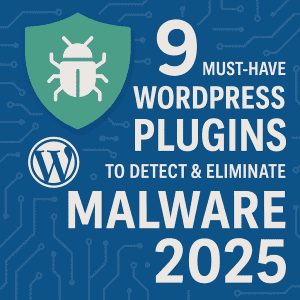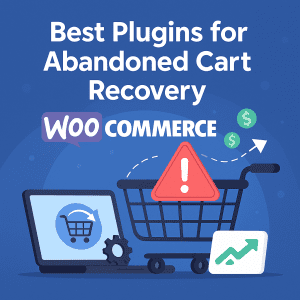 Say, building a site is much like building a house. You do not just erect four walls and a roof and call it a day, do you? The foundation, the locks on the doors, even an alarm system, might come to mind-this good-neighborhood kind of thing.
Say, building a site is much like building a house. You do not just erect four walls and a roof and call it a day, do you? The foundation, the locks on the doors, even an alarm system, might come to mind-this good-neighborhood kind of thing.
You do not need to be a cybersecurity expert to keep your digital real estate safe. With the proper WordPress plugins and maybe some strategic planning, you can build a fortress around your site to tell those pesky hackers, "Malware? No thanks!"
This is beyond just connecting a few wires to avoid minor inconveniences. A hacked site can lead to data breaches, loss of customer trust, SEO penalties, and even eventual site crash. That flies to be fatal for any business, particularly for small businesses.
So, have you been asking how you can keep a WordPress website safe and sound? Well, you are right. We are discussing the formation of security layers, from looking for the best-managed WordPress hosting Canada has to offer good luck web hosting Vancouver Canada and web hosting services Toronto!, realizing that Boost Your Website's Speed: Why Toronto Businesses Need Local Hosting is not just about speed but security, and even touch on what comprises The Top 5 Small Business Web Hosting Services for 2025. Come on; let's get cracking and make that site of yours into a fort.
The Foundation: Damn the Host, It Matters (BIG!)
Even before you touch on plugins, the hugs note has to be given to your web host. Think of your website as the house. The plugins become the locks, alarms, and security cameras you put into your house, while your host can be likened to the foundation of the house and the neighborhood behind it. A strong and secure foundation does make all the difference.
This is where secure managed WordPress hosting enters top billing. A server is not just held up in the air for you; there is a complete team of experts who are constantly monitoring, updating, and optimizing your server in great detail for WordPress.
Benefits are many. For starters, you get:
- Automatic Updates: Your hosting provider takes care of WordPress core, theme, and plugin updates, so you are always up-to-date with the latest and most secure versions. One huge attack vector is taken away from you.
- Enhanced Security Measures: Managed hosts will install service-level firewalls, real-time malware scanning, brute force protection, and proactive vulnerability patching. They are literally watching your back 24/7.
- Better Performance: With optimized servers and built-in caching, your site will load much faster, an advantage for user experience and SEO.
- Expert Support: Run into a problem? You'll be talking to someone who really knows WordPress, not just some tech support guy. That's invaluable when you're really stuck.
- Automatic backups: Off-site backups generated regularly mean that, in case of extreme disaster, you can at least recover your site with minimal data loss.
Being a Canadian business owner, you might want to look for the best managed WordPress hosting Canada offers. Providers like 4goodhosting are persevered as trustworthy with Canadian-based infrastructure, thus bringing us to another very important point-local hosting.
Why Local Hosting Speeds Things Up (Especially in Canada)
Let us talk about why Boost Your Website's Speed: Why Toronto Businesses Need Local Hosting holds such paramount importance. When your clientele is scattered evenly across Canada, another advantage is brought to bear by having your servers located in Canada. Let's say, for example, a user situated in Toronto tries to access a website hosted in Texas; the data will have to take a much longer route so some latency than the other can be introduced, which is detrimental to page load times.
Postulate trying to converse with somebody across the ocean as opposed to with somebody who is in the same room. The nearer you are, the faster and more distinct communication will be. The same goes for web hosting. Hence, for all businesses in Toronto, opting for web hosting services Toronto means faster loading time for local clients, better user experience, and lower bounce rates that sometimes eventually lead to conversions. The same scenario goes for anyone looking for web hosting Vancouver Canada - local is almost always better for local traffic.
In general terms, when looking for the best web hosting in Canada, look for a Host with Canadian Data Centers. While it may not be apparent from the outset, even if speed is a minor consideration, data residency regulations are increasingly becoming an issue for Canadian companies, and the reason to consider a localized hosting provider.
That brings us to hosting, which is part of the reason that when discussing The Top 5 Small Business Web Hosting Services for 2025, security/hosting location is generally high on the list of criteria, for companies with a specific geographic targeting audience.
Alright, so you have a good foundation to build on. Now, let's take those security bricks and add some required WordPress plugins!
The Essential WordPress Security Plugin Arsenal
Think of these plugins as your multi-layered security system. No one plugin can do it all, but together they provide a powerful defense.
The All-in-One Security Suite: Wordfence Security
If there is one plugin that should be on the top of your list, it is Wordfence Security. This is your all-in-one bodyguard, with many different features to protect your site.
- Firewall Protection: Wordfence comes with a solid web application firewall (WAF) that identifies and blocks malicious traffic before it hits your WordPress site. It will block known vulnerabilities, like SQL injections, cross-site scripting (XSS), and more. It regularly updates its rules to stay ahead of new threats.
- Malware Scanner: Wordfence shines here. It scans your core, themes, and plugins to check for any malware, backdoors, or suspicious code. If anything is found, it will alert you and can help you fix it. They not only have powerful scanning, but they also encourage you to run your scan regularly; this is imperative so you can catch a threat sooner than later.
- Brute-Force Protection: The login pages on both WordPress and its plugins are usually prime targets for a Brute-Force attack, where the attacker attempts repeated password guessed without restriction. Wordfence will block any IP addresses immediately after the maximum number of login attempts are reached; there is no guessing with brute-force when Wordfence is engaged.
- Login Security: It also has things like two-factor authentication (2FA) to add an extra layer of security to your login. This makes it much more difficult for any unauthorized user to log into your site, even if they were somehow able to obtain your password. You can also enforce strong passwords for all users.
- Live Traffic Monitoring: With this tool you can view in real time not only the visits to your site but attempted hacks as well. You can identify suspicious activity and block bad IP addresses right from your dashboard.
- Country Blocking: If you receive constant attacks from a specific country and do not receive legitimate traffic from that country, you can block that country altogether.
Why it's a must-have: Wordfence is a strong, multi-prong approach to security. They have real-time threat intelligence that keeps it up to date on the latest vulnerabilities. It can scan and clean malware. The free version is great, however, the premium version goes even further with things such as the option for real-time firewall rule updates and a more extensive malware scan.
The Login Fortifier: Limit Login Attempts Reloaded
Wordfence is great for brute force protection, but a standalone plugin like Limit Login Attempts Reloaded can help you manage your log in attempts and enforce lockouts in a much lighter manner if you do not want to commit to a full security suite.
- Lockouts: You can properly customize how many log in attempts, for how long a lock out, and the lock out length can increase for repeat offenders.
- Blocks IPs: It automatically blocks IPs on the number of failed attempts that you specify.
- Notifications: You will receive notifications when someone is locked out of your site, so you have some level of awareness if someone is getting locked out due to trying to brute force their way onto your site.
- XML-RPC protection: Most brute force attacks focus on the XML-RPC interface which is used for remote publishing (leave it disabled unless you publish AMP and do publish remotely) and this plugin helps secure it.
Why you MUST have this plugin: Simple effective and often essential as it provides protections to stave off one of the most used attacks against WordPress sites. You will be surprised how often brute force attempts are made on your site. Even with a very strong password brute force attempts against your site are a load against your server which can even take your server down excess load. By using this plugin you will reduce this load against your server.
The Backup Buddy: UpdraftPlus WordPress Backup Plugin
Strictly speaking, it is not "preventative" per se for security purposes, but arguably the most vital tool for recovery. At best, nothing can go wrong—a plugin conflict, a bad update, or a really great attack that passes through your defenses; that's when a well-engineered backup really saves the day.
- Scheduled Backups: Choosing files, database, plugin, and theme for back up whole WordPress site on a handy schedule: daily, weekly, monthly.
- Cloud Storage Integration: Very importantly; UpdraftPlus exists to send backups to Google Drive, Dropbox, Amazon S3, OneDrive, and so on. From this perspective, backups are placed off-site, safe in case their server comes down.
- Easy Restoration: Restoring is very easy with the plugin: just a few clicks away from having your site restored.
- Incremental Backups (Premium): With incremental backups, you only back up the changes made since the last full backup, thereby conserving storage space and saving valuable time.
So grateful for it: Think of it as a "undo" button for your whole website. If your site gets hacked, corrupted, or crashes for whatever reason, then its recent backup stored offsite is a life raft. Never depend on your host for backups alone; having an independent backup system of yours is a vital factor for redundancy.
The Spam Blocker: Akismet Anti-Spam
If you have comments enabled on your blog, a contact form, or any kind of user-generated content, expect a heavy dose of spam: a lot of it! Spam is not only annoying but also could cause problems with malicious linking; it can hurt SEO as well as just making your site look shabby.
- Automatic Spam Filtering: Akismet analyzes your comments and contact form submissions in real-time, filtering spam out even before it can appear on your site.
- Spam History: You can review which comments Akismet has marked as spam or allow false positives, although these are rare.
- Performance Friendly: This plugin is packed with lightweight goodness-their primary concern is to keep your site running fast.
Why it should be installed: While it does not stop hacking per se, it keeps your site clean and decent from visual clutter and potential SEO damage caused by spam. It comes pre-installed with every copy of WordPress; just activate it and sign up for an API Key (for free, if it's for personal use or paid for commercial sites).
The Database Optimizer: WP-Optimize
An optimized database is a healthy database. A healthy database is a faster database. A faster database is less likely to encounter problems, and as a bonus, makes things like backups easier. A full database is a slower database!
- Clean Up Database: WP-Optimize can fully clean up unnecessary data, like post revisions, spam comments, items in the trash, and transient options from your database.
- Optimize Tables: The plugin can also optimize your tables, actually defragmenting them to boost query speed.
- Image Compression (premium): Optimizing images will not improve your security, but it is vital to speed. In the premium version, image compression is available.
Why it's a must have: A leaner and cleaner database is a happier database! This plugin can help alleviate potential headaches down the road and minimize the "surface area" for problems. As long as you are doing regular optimization (e.g., once a month), you should be just fine.
User Role Manager: User Role Editor
This "User Role Editor" plugin is not intended to block external threats, it simply protects your site from the inside. WordPress has default user roles (Administrator, Editor, Author, Contributor, or Subscriber). Sometimes you need to control what specific users can do, and can't do, in a more granular way.
- Custom Role Creation: You can create completely customized new user roles which have specific capabilities.
- Management of Capabilities: You can add or remove capabilities for any user role, including default ones. For example, you may want to give the Editor the capability to manage themes, but not to install new plugins.
- Hide Menus/Widgets: You can show/hide certain menu items, or widgets, for specific users in the role.
Why you should have it: An important security principles is the practice of least privilege. You need to make sure you do not give anyone access to more than they need. If you have more than one user on your WordPress site, User Role Editor helps you to greatly reduce the risk of accidental (or intentional) damage to your site. For example, if you hire someone to write your content, they only need "Editor" access, but the hire may be given "Administrator" access inadvertently.
The SSL Enforcer: Really Simple SSL
While not a security plugin in the classic sense, having an SSL certificate (the piece of technology that allows your website to enable HTTPS) is fundamental for a secure and trusted website. An SSL certificate encrypts the transactions between your website and your visitors and protects sensitive information like passwords and credit card numbers.
- One click SSL: If you have an SSL certificate already installed by your host (and you should!), then with a click of a button Really Simple SSL will take care of directing all of your sites traffic to HTTPS.
- Mixed Content Fixer: It fixes mixed content warnings that occur when some resources on an HTTPS page are still loaded over HTTP.
Why you need it: SSL is not optional, it's a necessity. Google prioritizes HTTPS sites in it's ranking considerations, and browsers actively warn users when a site is not secure. Since migrating to HTTPS is hassle-free to run if your host has already enabled the SSL certificate for you, you might as well use this plugin to make it easy!
Swiss Army Knife (with a Security Blade): Jetpack
Jetpack, from the WordPress purveyor (Automattic), is somewhat of a mixed bag. As it’s an “omnibus” plugin, it tries to do lots of things – stats, social sharing, and security – and while only some of them are focused on keeping hackers out, it comes with some great security tools.
- Security Scanning & Monitoring (Premium): Jetpack provides daily malware scanning and security monitoring to notify you of threats and vulnerabilities. It can even assist you with fixing them.
- Brute-Force Attack Protection: Jetpack can protect your login page from bots with repeated login attempts like dedicated plugins.
- Downtime Monitoring: Jetpack actively monitors your site and will instantly notify you as soon as it goes down so you can act quickly.
- Secure Sign-On: Jetpack provides an optional way for you to login more securely using your WordPress.com account.
Why it matters: if you’re already utilizing Jetpack’s other functionality — such as site stats, related posts, and contact forms — then choosing it for part of the package on security is easy. You don’t have to add yet another security plugin to your list, and can efficiently manage aspects of your site from one dashboard.
However, if you’re using Jetpack solely for security — and not for additional functionality — it’s possible there are better focused and potentially lighter-weight options (as discussed earlier with Wordfence — which focuses on security alone). Ultimately, it’s about weighing convenience against reliable purpose-built functions for your needs.
The Elite Guardian: Sucuri Security
When it comes to web security, Sucuri has got a fantastic reputation, and with good reason. Sucuri is more than a simply a plugin, it's a full-blown security platform that brings an effective Web Application Firewall (WAF) with an array of other key features that make it a strong layer in your websites defense.
- Malware & Hack Cleanup: This is where Sucuri excels. If your site gets hacked (even by accident!), Sucuri will clean-up
for you. That's really priceless.
- Advanced DDoS Mitigation: Denial of Service (DoS) or Distributed Denial of Service (DDoS) attack is a malicious attack that floods your website with traffic making it completely inaccessible. Sucuri has produced an amazing way to block malicious traffic.
- Malware & Hack Scan Frequency: Sucuri scans for malware, spam, blacklisting, and other vulnerabilities at a high frequency, it detects threats faster.
- Website Firewall (WAF): Just like Wordfence, Sucuri has a Web Application Firewall (WAF) that sits in between your visitors and your WordPress site, stopping malicious requests before they reach your site.
Why it's a must-have: Sucuri provides a premium, all-in-one security solution. It's true, it does charge a subscription, but the proactive security monitoring provided, extremely useful firewall, and of course, the hack cleanup service makes it worth every penny to serious businesses. It's basically hiring your own cybersecurity team, where problems are addressed and mitigated before they become serious issues, and even if you are hacked (which could happen to anyone), you know your site is back up in no time!
To Step Outside the Realm of the Plugins: Good Security Hygiene
Plugins are powerful, but just one component of your security strategy. Here are a few practices to best supplement your plugin collection:
- Use Strong Passwords, Always: This seems like a no-brainer, but it's a simple step that is generally ignored. Use long, complex, and unique passwords for your WordPress admin account, and any other important accounts. Think phrases, not just words. Use a password manager!
- Maintain Regular Updates (Core, Themes, Plugins): Once again, as stated when I discussed managed hosting, make sure everything is up-to-date. These are often vulnerabilities that get discovered and patched, so to be using outdated versions is like keeping your doors wide open.
- Delete Themes and Plugins You're Not Using: Every theme and plugin you have installed (even when its inactive) is a potential door for the hackers. If you aren't using it, delete it.
- Change Your Default WordPress Login URL: The default yourdomain.com/wp-admin is a great target for bots, this is common knowledge now. Most security plugins (over the years I have been using them, Wordfence is just one of many) are happy to defer to your URL choice!
- Turn Off File Editing (If Not Needed): WordPress comes with a built-in file editor, allowing you to make changes to your theme and plug-in files via the dashboard. That's all well and good, but when a hacker has access to your site, they can also take advantage of that feature and use it to place and run malicious code. You can do this by adding def.('DISALLOW_FILE_EDIT', true); into your wp-config.php file.
- Use A Reputable Theme and Plugins: Only download themes and plugins only from the official WordPress.org repository or a recognized marketplace. Often free themes/plugins from unrecognized sources are sold as free but actually contain malicious code.
- Use A Reputable Web Host: We introduced this point at the beginning and will say it again. A reputable web host provides the basic layer of security on which to grow. Companies such as 4goodhosting will provide the environment you need to succeed online. Whether you are looking for web hosting Vancouver Canada or web hosting services Toronto, choose a provider who has a strong security track record and reliable support.
- Back Up Your Site (Redundancy is Your Friend!): Even though your host has a daily backup schedule, having your own backup option
- gives you that extra piece of mine.
- Watch Your Site: Make sure to keep an eye on your site's performance, users, and any unusual activity. Tools like Google Search Console can help alert you to security issues.
- Stay Informed: Make sure that you and your team are up to date with common WordPress vulnerabilities and good security practices. If you have collaborators who have access to your site, make sure they are following your own security protocols.
Putting It All Together: A Secure WordPress Strategy
Think of your website as a physical store front of a business.
- You Hosting (e.g. 4goodhosting, especially if you want some of the best managed WordPress hosting Canada): This is the building itself, the foundation, and the security of the neighbor's. If you're in a secure managed WordPress hosting environment, you're in a secure district that is kept well, with security, alarms, and surveillance. You'll see the benefits of managed WordPress hosting as you have access to the secure space without being responsible for being a security expert yourself. And for Toronto businesses, using a web hosting services Toronto means faster access to local customers and it shows why Boost Your Website's Speed: Why Toronto Businesses Need Local Hosting is needed.
- Wordfence Security: This is your high-end alarm system, camera surveillance, and a vigilant security person at your front door, finding and blocking intruders before they break anything.
- Limit Login Attempts Reloaded: This is the strengthened lock on your front door specifically designed to stop multiple attempts to break into your business.
- UpdraftPlus: This is your fire-protected safe holding all your important documents and jewels, and if the worst happens you can simply start again from scratch.
- Akismet: This is your no junk mail sign and a scrupulous assistant who screens all your incoming mail to let only real messages through.
- WP-Optimize: This is your cleaning and maintenance crew, constantly keeping the inside of your business clean and clutter-free.
- User Role Editor: It keeps your employees from getting into parts of your business that they don't need (or shouldn't) be. Just in case something gets done that shouldn't have.
- Really Simple SSL: It's the "secure transaction" sticker on your window. This tells your customers that they can rest assured your business keeps the things they do private and safe.
By using these plugins and you keep your security hygiene in check, then your firm will not be: Just reacting to threats, rather building a proactive plan that is leaning toward a good defense. Your very saying to hackers: "Malware? Nuh!!". Small businesses, especially when you think of recommendations like The Top 5 Small Business Web Hosting Services for 2025 need to emphasize protection because reputable hosting partners like 4goodhosting keep long term value on the internet. Good luck. Stay safe!














